Yueyue Wu
LegalOne: A Family of Foundation Models for Reliable Legal Reasoning
Feb 03, 2026Abstract:While Large Language Models (LLMs) have demonstrated impressive general capabilities, their direct application in the legal domain is often hindered by a lack of precise domain knowledge and complexity of performing rigorous multi-step judicial reasoning. To address this gap, we present LegalOne, a family of foundational models specifically tailored for the Chinese legal domain. LegalOne is developed through a comprehensive three-phase pipeline designed to master legal reasoning. First, during mid-training phase, we propose Plasticity-Adjusted Sampling (PAS) to address the challenge of domain adaptation. This perplexity-based scheduler strikes a balance between the acquisition of new knowledge and the retention of original capabilities, effectively establishing a robust legal foundation. Second, during supervised fine-tuning, we employ Legal Agentic CoT Distillation (LEAD) to distill explicit reasoning from raw legal texts. Unlike naive distillation, LEAD utilizes an agentic workflow to convert complex judicial processes into structured reasoning trajectories, thereby enforcing factual grounding and logical rigor. Finally, we implement a Curriculum Reinforcement Learning (RL) strategy. Through a progressive reinforcement process spanning memorization, understanding, and reasoning, LegalOne evolves from simple pattern matching to autonomous and reliable legal reasoning. Experimental results demonstrate that LegalOne achieves state-of-the-art performance across a wide range of legal tasks, surpassing general-purpose LLMs with vastly larger parameter counts through enhanced knowledge density and efficiency. We publicly release the LegalOne weights and the LegalKit evaluation framework to advance the field of Legal AI, paving the way for deploying trustworthy and interpretable foundation models in high-stakes judicial applications.
Chinese Court Simulation with LLM-Based Agent System
Aug 24, 2025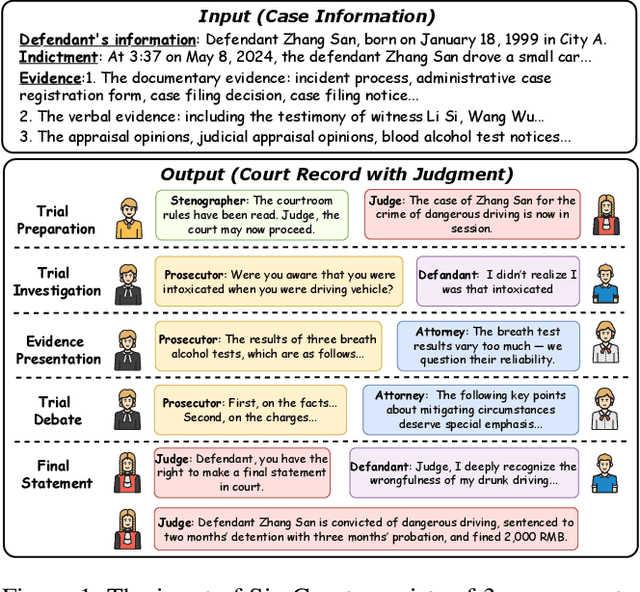

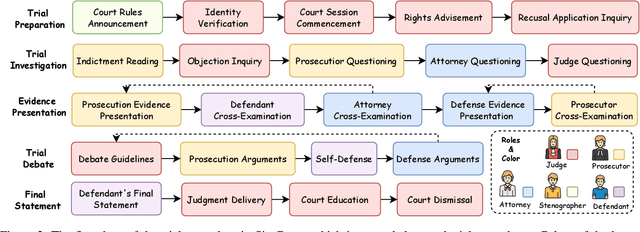

Abstract:Mock trial has long served as an important platform for legal professional training and education. It not only helps students learn about realistic trial procedures, but also provides practical value for case analysis and judgment prediction. Traditional mock trials are difficult to access by the public because they rely on professional tutors and human participants. Fortunately, the rise of large language models (LLMs) provides new opportunities for creating more accessible and scalable court simulations. While promising, existing research mainly focuses on agent construction while ignoring the systematic design and evaluation of court simulations, which are actually more important for the credibility and usage of court simulation in practice. To this end, we present the first court simulation framework -- SimCourt -- based on the real-world procedure structure of Chinese courts. Our framework replicates all 5 core stages of a Chinese trial and incorporates 5 courtroom roles, faithfully following the procedural definitions in China. To simulate trial participants with different roles, we propose and craft legal agents equipped with memory, planning, and reflection abilities. Experiment on legal judgment prediction show that our framework can generate simulated trials that better guide the system to predict the imprisonment, probation, and fine of each case. Further annotations by human experts show that agents' responses under our simulation framework even outperformed judges and lawyers from the real trials in many scenarios. These further demonstrate the potential of LLM-based court simulation.
JuDGE: Benchmarking Judgment Document Generation for Chinese Legal System
Mar 20, 2025Abstract:This paper introduces JuDGE (Judgment Document Generation Evaluation), a novel benchmark for evaluating the performance of judgment document generation in the Chinese legal system. We define the task as generating a complete legal judgment document from the given factual description of the case. To facilitate this benchmark, we construct a comprehensive dataset consisting of factual descriptions from real legal cases, paired with their corresponding full judgment documents, which serve as the ground truth for evaluating the quality of generated documents. This dataset is further augmented by two external legal corpora that provide additional legal knowledge for the task: one comprising statutes and regulations, and the other consisting of a large collection of past judgment documents. In collaboration with legal professionals, we establish a comprehensive automated evaluation framework to assess the quality of generated judgment documents across various dimensions. We evaluate various baseline approaches, including few-shot in-context learning, fine-tuning, and a multi-source retrieval-augmented generation (RAG) approach, using both general and legal-domain LLMs. The experimental results demonstrate that, while RAG approaches can effectively improve performance in this task, there is still substantial room for further improvement. All the codes and datasets are available at: https://github.com/oneal2000/JuDGE.
LexRAG: Benchmarking Retrieval-Augmented Generation in Multi-Turn Legal Consultation Conversation
Feb 28, 2025Abstract:Retrieval-augmented generation (RAG) has proven highly effective in improving large language models (LLMs) across various domains. However, there is no benchmark specifically designed to assess the effectiveness of RAG in the legal domain, which restricts progress in this area. To fill this gap, we propose LexRAG, the first benchmark to evaluate RAG systems for multi-turn legal consultations. LexRAG consists of 1,013 multi-turn dialogue samples and 17,228 candidate legal articles. Each sample is annotated by legal experts and consists of five rounds of progressive questioning. LexRAG includes two key tasks: (1) Conversational knowledge retrieval, requiring accurate retrieval of relevant legal articles based on multi-turn context. (2) Response generation, focusing on producing legally sound answers. To ensure reliable reproducibility, we develop LexiT, a legal RAG toolkit that provides a comprehensive implementation of RAG system components tailored for the legal domain. Additionally, we introduce an LLM-as-a-judge evaluation pipeline to enable detailed and effective assessment. Through experimental analysis of various LLMs and retrieval methods, we reveal the key limitations of existing RAG systems in handling legal consultation conversations. LexRAG establishes a new benchmark for the practical application of RAG systems in the legal domain, with its code and data available at https://github.com/CSHaitao/LexRAG.
CaseGen: A Benchmark for Multi-Stage Legal Case Documents Generation
Feb 25, 2025



Abstract:Legal case documents play a critical role in judicial proceedings. As the number of cases continues to rise, the reliance on manual drafting of legal case documents is facing increasing pressure and challenges. The development of large language models (LLMs) offers a promising solution for automating document generation. However, existing benchmarks fail to fully capture the complexities involved in drafting legal case documents in real-world scenarios. To address this gap, we introduce CaseGen, the benchmark for multi-stage legal case documents generation in the Chinese legal domain. CaseGen is based on 500 real case samples annotated by legal experts and covers seven essential case sections. It supports four key tasks: drafting defense statements, writing trial facts, composing legal reasoning, and generating judgment results. To the best of our knowledge, CaseGen is the first benchmark designed to evaluate LLMs in the context of legal case document generation. To ensure an accurate and comprehensive evaluation, we design the LLM-as-a-judge evaluation framework and validate its effectiveness through human annotations. We evaluate several widely used general-domain LLMs and legal-specific LLMs, highlighting their limitations in case document generation and pinpointing areas for potential improvement. This work marks a step toward a more effective framework for automating legal case documents drafting, paving the way for the reliable application of AI in the legal field. The dataset and code are publicly available at https://github.com/CSHaitao/CaseGen.
LegalAgentBench: Evaluating LLM Agents in Legal Domain
Dec 23, 2024Abstract:With the increasing intelligence and autonomy of LLM agents, their potential applications in the legal domain are becoming increasingly apparent. However, existing general-domain benchmarks cannot fully capture the complexity and subtle nuances of real-world judicial cognition and decision-making. Therefore, we propose LegalAgentBench, a comprehensive benchmark specifically designed to evaluate LLM Agents in the Chinese legal domain. LegalAgentBench includes 17 corpora from real-world legal scenarios and provides 37 tools for interacting with external knowledge. We designed a scalable task construction framework and carefully annotated 300 tasks. These tasks span various types, including multi-hop reasoning and writing, and range across different difficulty levels, effectively reflecting the complexity of real-world legal scenarios. Moreover, beyond evaluating final success, LegalAgentBench incorporates keyword analysis during intermediate processes to calculate progress rates, enabling more fine-grained evaluation. We evaluated eight popular LLMs, highlighting the strengths, limitations, and potential areas for improvement of existing models and methods. LegalAgentBench sets a new benchmark for the practical application of LLMs in the legal domain, with its code and data available at \url{https://github.com/CSHaitao/LegalAgentBench}.
LexEval: A Comprehensive Chinese Legal Benchmark for Evaluating Large Language Models
Sep 30, 2024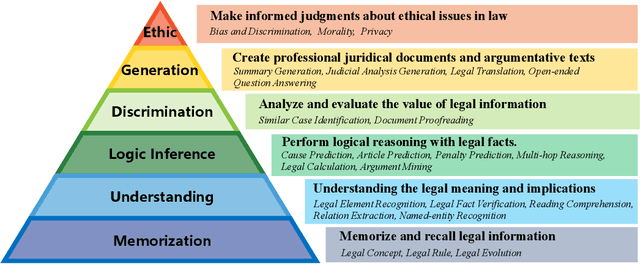



Abstract:Large language models (LLMs) have made significant progress in natural language processing tasks and demonstrate considerable potential in the legal domain. However, legal applications demand high standards of accuracy, reliability, and fairness. Applying existing LLMs to legal systems without careful evaluation of their potential and limitations could pose significant risks in legal practice. To this end, we introduce a standardized comprehensive Chinese legal benchmark LexEval. This benchmark is notable in the following three aspects: (1) Ability Modeling: We propose a new taxonomy of legal cognitive abilities to organize different tasks. (2) Scale: To our knowledge, LexEval is currently the largest Chinese legal evaluation dataset, comprising 23 tasks and 14,150 questions. (3) Data: we utilize formatted existing datasets, exam datasets and newly annotated datasets by legal experts to comprehensively evaluate the various capabilities of LLMs. LexEval not only focuses on the ability of LLMs to apply fundamental legal knowledge but also dedicates efforts to examining the ethical issues involved in their application. We evaluated 38 open-source and commercial LLMs and obtained some interesting findings. The experiments and findings offer valuable insights into the challenges and potential solutions for developing Chinese legal systems and LLM evaluation pipelines. The LexEval dataset and leaderboard are publicly available at \url{https://github.com/CSHaitao/LexEval} and will be continuously updated.
LeKUBE: A Legal Knowledge Update BEnchmark
Jul 19, 2024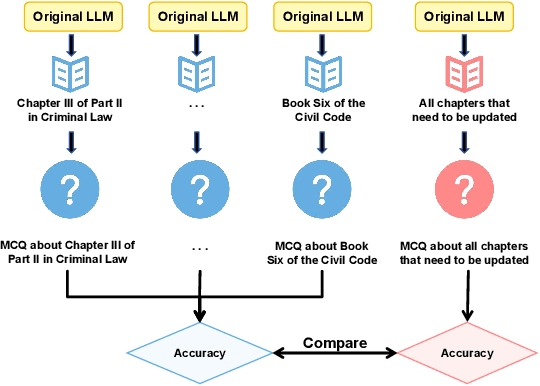
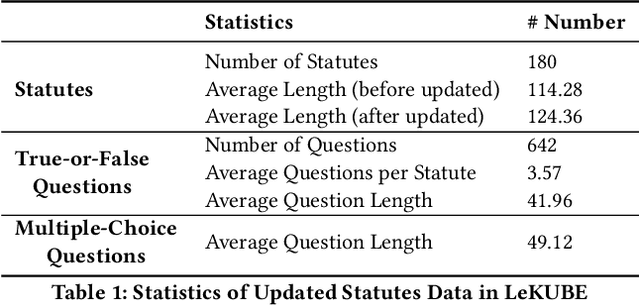
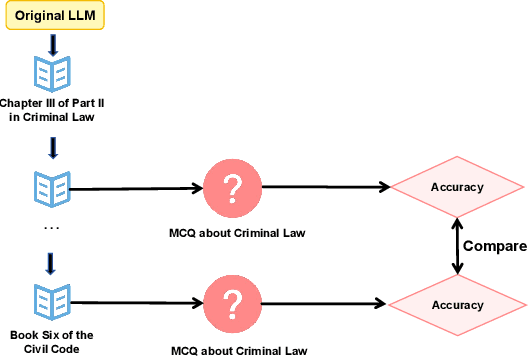
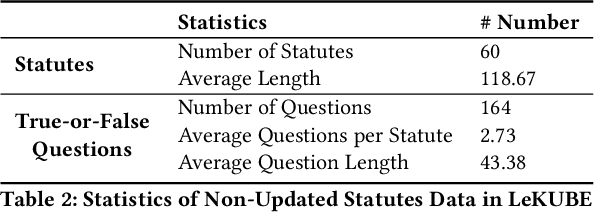
Abstract:Recent advances in Large Language Models (LLMs) have significantly shaped the applications of AI in multiple fields, including the studies of legal intelligence. Trained on extensive legal texts, including statutes and legal documents, the legal LLMs can capture important legal knowledge/concepts effectively and provide important support for downstream legal applications such as legal consultancy. Yet, the dynamic nature of legal statutes and interpretations also poses new challenges to the use of LLMs in legal applications. Particularly, how to update the legal knowledge of LLMs effectively and efficiently has become an important research problem in practice. Existing benchmarks for evaluating knowledge update methods are mostly designed for the open domain and cannot address the specific challenges of the legal domain, such as the nuanced application of new legal knowledge, the complexity and lengthiness of legal regulations, and the intricate nature of legal reasoning. To address this gap, we introduce the Legal Knowledge Update BEnchmark, i.e. LeKUBE, which evaluates knowledge update methods for legal LLMs across five dimensions. Specifically, we categorize the needs of knowledge updates in the legal domain with the help of legal professionals, and then hire annotators from law schools to create synthetic updates to the Chinese Criminal and Civil Code as well as sets of questions of which the answers would change after the updates. Through a comprehensive evaluation of state-of-the-art knowledge update methods, we reveal a notable gap between existing knowledge update methods and the unique needs of the legal domain, emphasizing the need for further research and development of knowledge update mechanisms tailored for legal LLMs.
Improving Legal Case Retrieval with Brain Signals
Mar 20, 2024



Abstract:The tasks of legal case retrieval have received growing attention from the IR community in the last decade. Relevance feedback techniques with implicit user feedback (e.g., clicks) have been demonstrated to be effective in traditional search tasks (e.g., Web search). In legal case retrieval, however, collecting relevance feedback faces a couple of challenges that are difficult to resolve under existing feedback paradigms. First, legal case retrieval is a complex task as users often need to understand the relationship between legal cases in detail to correctly judge their relevance. Traditional feedback signal such as clicks is too coarse to use as they do not reflect any fine-grained relevance information. Second, legal case documents are usually long, users often need even tens of minutes to read and understand them. Simple behavior signal such as clicks and eye-tracking fixations can hardly be useful when users almost click and examine every part of the document. In this paper, we explore the possibility of solving the feedback problem in legal case retrieval with brain signal. Recent advances in brain signal processing have shown that human emotional can be collected in fine grains through Brain-Machine Interfaces (BMI) without interrupting the users in their tasks. Therefore, we propose a framework for legal case retrieval that uses EEG signal to optimize retrieval results. We collected and create a legal case retrieval dataset with users EEG signal and propose several methods to extract effective EEG features for relevance feedback. Our proposed features achieve a 71% accuracy for feedback prediction with an SVM-RFE model, and our proposed ranking method that takes into account the diverse needs of users can significantly improve user satisfaction for legal case retrieval. Experiment results show that re-ranked result list make user more satisfied.
Evaluation Ethics of LLMs in Legal Domain
Mar 17, 2024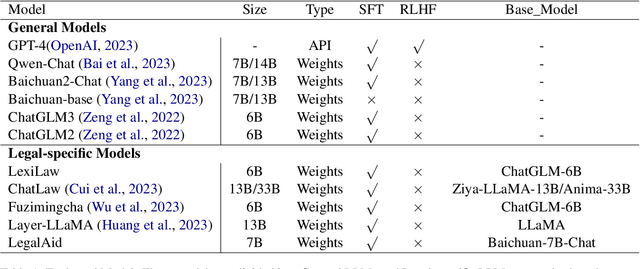



Abstract:In recent years, the utilization of large language models for natural language dialogue has gained momentum, leading to their widespread adoption across various domains. However, their universal competence in addressing challenges specific to specialized fields such as law remains a subject of scrutiny. The incorporation of legal ethics into the model has been overlooked by researchers. We asserts that rigorous ethic evaluation is essential to ensure the effective integration of large language models in legal domains, emphasizing the need to assess domain-specific proficiency and domain-specific ethic. To address this, we propose a novelty evaluation methodology, utilizing authentic legal cases to evaluate the fundamental language abilities, specialized legal knowledge and legal robustness of large language models (LLMs). The findings from our comprehensive evaluation contribute significantly to the academic discourse surrounding the suitability and performance of large language models in legal domains.
 Add to Chrome
Add to Chrome Add to Firefox
Add to Firefox Add to Edge
Add to Edge